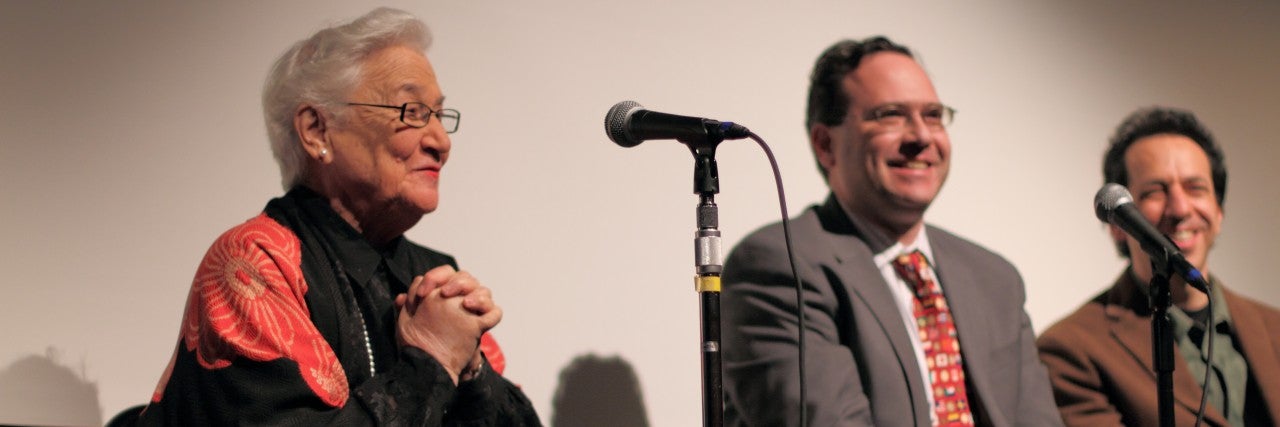May 2, 2018
By Dylan Adelman
Beate Sirota Gordon was the only woman in the room when Article 24 of the Constitution of Japan was negotiated in 1946. Guaranteeing equality before the law, it would become the defining pillar of women’s rights in modern Japan. Through a confluence of chance events, Beate, born into a Jewish family in Vienna in 1923, found herself at the drafting table representing the American government at the young age of 22.
Beate was five when she and her family left Vienna so that her father, Leo Sirota, could join the faculty at the Japanese Imperial Academy of Music. She would spend the next ten years in Tokyo, first at a German school and then at an American one after Nazi supporters and propaganda began to surface in Japan. At age 15 she traveled to California to attend Mills College while her parents remained in Japan. It was 1939.
Two years later, when war erupted between Japan and the U.S., Beate lost contact with her parents, who, she later learned, had been interned in Nagano as potential enemies of Japan. As a fluent Japanese speaker, she took a job as a translator with the American Office of War Information. In 1945, with the end of the war, she returned to Japan to search for her family through the only means possible for a civilian at the time: as an interpreter for General Douglas MacArthur, Supreme Commander for the Allied Powers (SCAP) in Japan.
And that is how a young Jewish woman from Vienna was tasked with helping craft the Constitution of Japan. As the only woman on the committee, Beate was assigned the section on women’s rights. As she recalls in her memoir, she was determined to press for equality of all citizens, and especially equality in marriage. Working in secret, trusted by General MacArthur to produce a draft in one week, Beate produced the following:
Article 14: All of the people are equal under the law and there shall be no discrimination in political, economic or social relations because of race, creed, sex, social status or family origin.
Article 24: With regard to choice of spouse, property rights, inheritance, choice of domicile, divorce and other matters pertaining to marriage and the family, laws shall be enacted from the standpoint of individual dignity and the essential equality of the sexes.
Marriage shall be based only on the mutual consent of both sexes and it shall be maintained through mutual cooperation with the equal rights of husband and wife as a basis.
This was a revolutionary step towards racial and gender equality; similar assurances of women’s equality are absent from the U.S. Constitution even today. It took hours of negotiation and debate with Japanese officials to ensure that Article 24 would reach the final draft.
In May 1947, the Constitution was enacted with Beate’s text included. However, it wasn’t until she published The Only Woman in the Room in 1995 that her contribution became publicly known. She waited that long for fear that if critics knew that their author was a 22-year-old woman, they might seek to nullify them. Instead, when her book was finally released in Japan, she was embraced by many as a champion in the struggle for women’s and civil rights.
Beate passed away in 2012, after a long career in the performance arts. She traveled the world to bring traditional Asian performing artists to North America and served as a consultant and Director of Performing Arts at both the Japan Society and the Asia Society in New York. In addition, she produced numerous videos, records, and scholarly essays, and received many prestigious awards for her life’s work. She was a bridge-builder, a pioneering feminist, and a key figure in advancing human rights and democratic values.
This article was written by the AJC Asia Pacific Institute (API) in celebration of Japan’s Constitution Day, May 3. API works to initiate and strengthen ties with Asian and Asian American opinion leaders and decision makers. We foster strategic alliances with governments, civil society, media, and business leaders throughout Asia, and raise awareness about the Jewish people and Israel.
Dylan Adelman is Senior Program Associate at the AJC Asia Pacific Institute.


